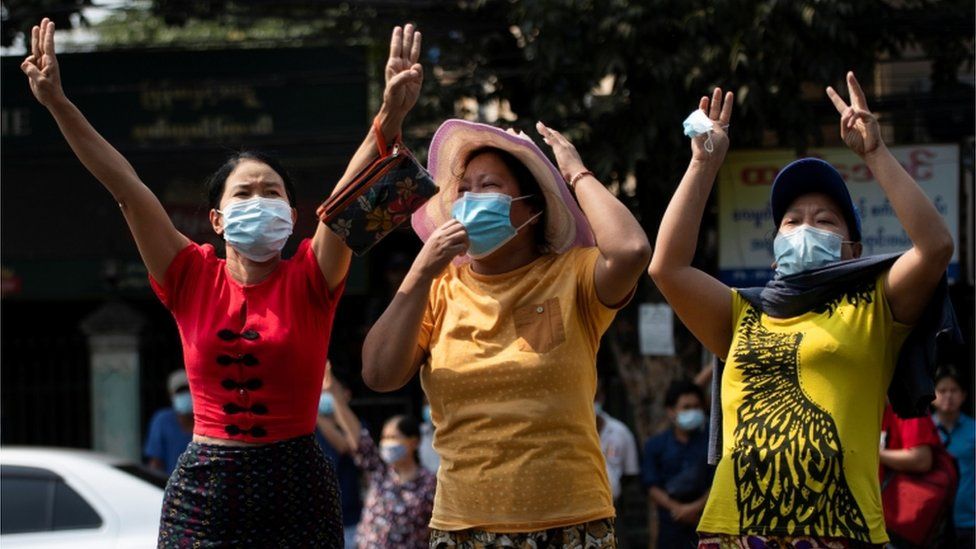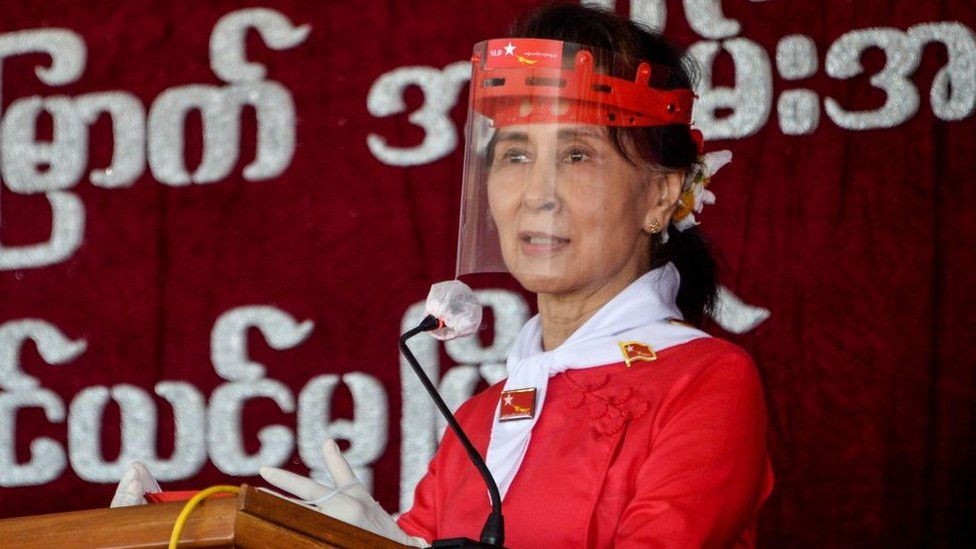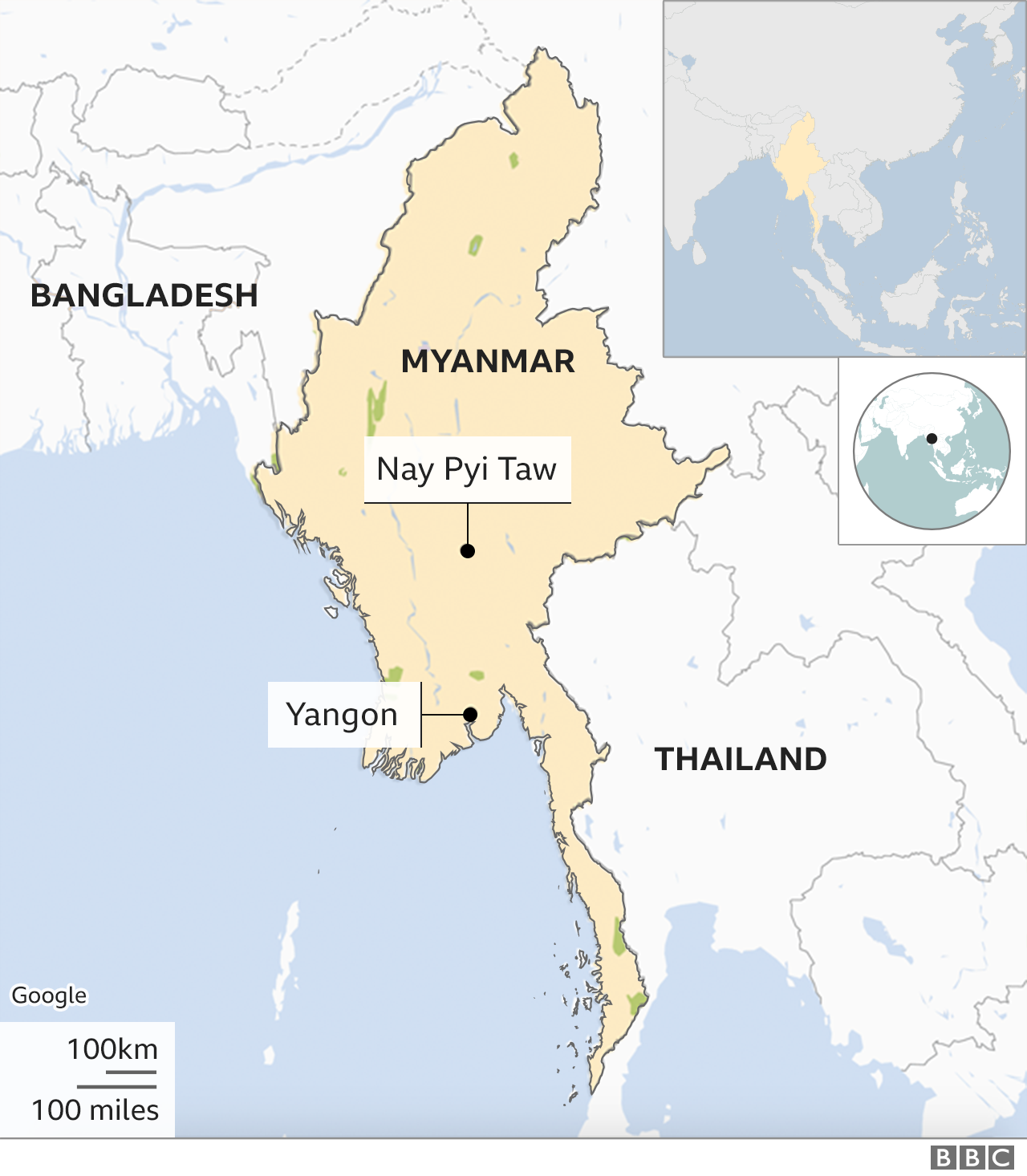Myanmar coup: Thousands gather for second day of protests
 image copyrightReuters
image copyrightReutersThousands of people have taken to the streets of Myanmar's main city, Yangon, for a second day of mass protests over the military coup of nearly a week ago.
Men and women, many of them young, held up pictures of detained leader Aung San Suu Kyi and wore red, the colour of her National League for Democracy party.
"Respect our vote," read one banner in reference to the NLD landslide win in November's election.
Yet people have still been finding ways to get images and videos of the protests out.
Many demonstrators gave the three-fingered symbol-of-protest salute and held red balloons, while cars and buses slowed to sound their horns in support.
"We will move forward and keep demanding until we get democracy," one protester, Myo Win, 37, told the AFP news agency.
Police trucks and officers in riot gear were stationed on the streets near Yangon University.
So far the military authorities are not stopping this show of mass defiance, but everyone assumes they will try before long, the BBC's South East Asia correspondent Jonathan Head reports.
Smaller demonstrations were also reported on Sunday morning in Mawlamine and Mandalay.
Elected leader Aung San Suu Kyi, President Win Myint and other senior NLD leaders have been under house arrest since the military took control of government on 1 February and declared a year-long state of emergency.
Social media's role as coup unfolded
The coup took place as a new session of parliament was set to open, following the November election in which the NLD party won 80% of parliamentary seats.
 image copyrightGetty Images
image copyrightGetty ImagesMany Burmese watched the events unfold in real time on Facebook, which is the country's primary source of information and news. But three days later, internet providers were ordered to block the platform for stability reasons.
Following the ban, thousands of users were active on Twitter and Instagram using hashtags to express their opposition to the takeover. By 22:00 local time (15:30 GMT) on Friday access to those platforms had also been denied.
There was no official word from the coup leaders but AFP reported it had seen an unverified ministry document that said the two social media sites were being used to "cause misunderstanding among the public".
A spokeswoman for Twitter said the ban undermined "the public conversation and the rights of people to make their voices heard". Facebook, which owns Instagram, called on the authorities to "restore connectivity".
Human rights group Amnesty International called the internet shutdown "heinous and reckless" and warned it could put the people of Myanmar at risk of human rights violations.
Myanmar at a glance
Myanmar is a country of 54 million people in South East Asia which shares borders with Bangladesh, India, China, Thailand and Laos.
It was ruled by an oppressive military government from 1962 to 2011, either directly or indirectly, leading to international condemnation and sanctions.
Aung San Suu Kyi spent years campaigning for democratic reforms. A gradual liberalisation began in 2010, though the military still retained considerable influence.
A government led by Ms Suu Kyi came to power after free elections in 2015. But a deadly military crackdown two years later on Rohingya Muslims sent hundreds of thousands fleeing to Bangladesh.
It triggered a rift between Ms Suu Kyi and her previous supporters in the international community after she refused to condemn the crackdown or describe it as ethnic cleansing.
But she has remained hugely popular at home, shown in her party's landslide win in the November election.



Have you been affected by recent events in Myanmar? You can share your experience by emailing haveyoursay@bbc.co.uk.
Please include a contact number if you are willing to speak to a BBC journalist. You can also get in touch in the following ways:
- WhatsApp: +44 7756 165803
- Tweet: @BBC_HaveYourSay
- Please read our terms & conditions and privacy policy



No comments